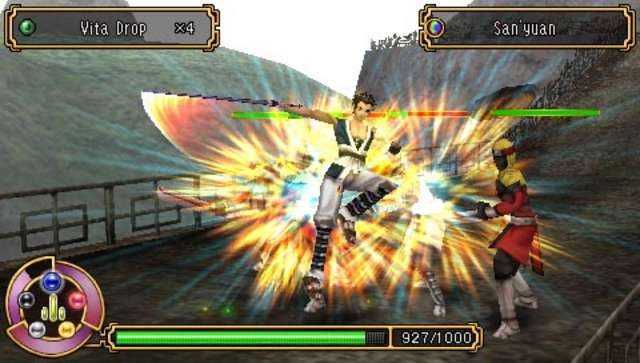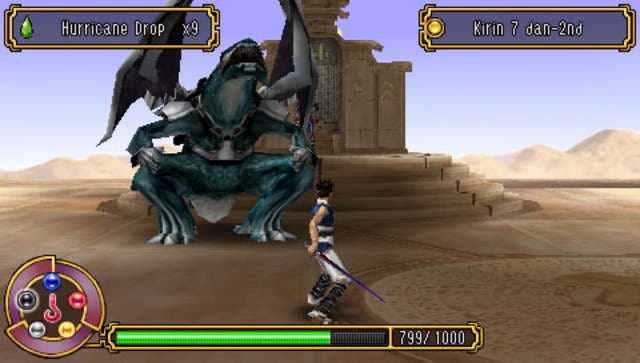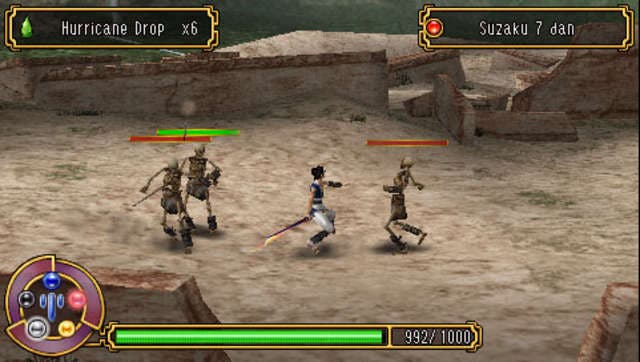Key of Heaven
Door to hell?
It's no surprise that PSP-exclusive RPGs are so scarce. Quit whining and actually think about it for two seconds: simple-looking 2D adventures based on the form and function of the SNES role-playing heyday, while affordable to make, don't fit the aspirational futuristic branding too well. After all, we might know that sprites can still be totally amazing, but they hardly inspire tech envy from the eyes peering hungrily over your shoulder on the bus.
On the other hand, sprawling macro-narratives populated by WETA-style leathery-faced orcs and chisel-chinned polygonal heroes all lit cinematically by a continuous graphical firework display take a load of people with a load of time and a load of cash to make. It's unlikely that any publisher would lay down the same kind of financial and temporal investment that a grown up console's AAA RPG would need for what's essentially a little pocket gamble in a niche and expensive genre.
So, let's start this gratefully: Key of Heaven (Kingdom of Paradise in the US, Tenchi No Mon in Japan) is neither a port nor a cross-platform hedged bet. It's rather a well-presented, PSP-exclusive Action RPG mixing up the immediacy of beat-'em-up style fight mechanics with RPG-lite levelling and questing. It's long, good-looking and mostly spectacular (if a little soulless) in its kinetic visual appeal. Hero Shinbu's attack moves dance and twirl eloquently across the PSP's delicious screen and, for public transport show-offs, it's exactly the kind of pretty faced companion to inspire jealous stares.
The beauty isn't all skin deep either; this is one model that has clearly tried to better herself with a little education. The battle system is inventive and, initially at least, compulsive. 'Bugei' are special combat scrolls that you must equip Shinbu with to unlock his moves. The Bugei must be filled in with 'Kenpu': collectable tokens that represent attack moves that can be strung together into sequences. The more Kenpu move tokens that you fill each Bugei with, the more moves at your disposal.
This central dynamic is then overlaid with elemental considerations (in the usual rock, paper, scissors style) and so the player must decide which elemental set of Kenpu moves to use against which elemental enemy. Finally, magic (Chi) elemental attacks are available to attack groups of enemies.

It's clearly a lot to think about so the developer has tempered the magnanimity of offensive options by making all moves executable with just one button. This instantly neuters the excitement you feel at the prospect of being able to play an RPG with Final Fight/Golden Axe quick strategy mechanics as all the fun and variety of your actual physical interaction with the PSP is regressed to single-button-mashing in favour of making the planning and set-up of your character strategic king.
It's made worse by a parry move, essential to maintain at least the illusion of intelligent action-RPG mechanic, that suffers from an extremely delayed input/output. You'll see an enemy attack coming long before it strikes yet, even by quickly attempting a parry, you'll often have to wait and be struck before dodging out of the way.
This would be just disappointing - but not game-breaking - if it weren't for the fact that you'll be doing an inordinate amount of fighting over the course of the 20-hour storyline. Collecting abilities is actually just a way for the developer to disguise the fact that you are simply uncovering Shinbu's predestined skills. There's no real customisation going on here: just superficial pick and mix combat and to take the strategy, skill and urgency out of the actual business of tapping the PSP's buttons to execute attacks turns out to be just boring in the long run.

It's also clearly been tricky for the developer to balance the ambitious offensive options across such a long game. Chi attacks quickly become more powerful than the majority of Shinbu's sword attacks and, as there is no 'magic' gauge (simply stand still for a few seconds to charge them up unlimited amount of times), it unbalances the whole fighting dynamic. All of the development time has been taken up with crafting the 150+ sword techniques so the Chi attacks lack much variety. Indeed, as you'll end up using these more than sword attacks just simply to get through the fights as quickly as possible, the entire battle system, while fast, furious and ostensibly fun to the onlooker, ultimately falls apart.
But in the short term it's a lot of fun. The feel of the game is reminiscent of the Xbox's Jade Empire mixing up, as both games do, Chinese and Japanese mythology and mysticism. Indeed, many of the characters are lifted from these traditions and the astute player will probably feel quite pleased with himself for discerning as much. However, the voice acting in the game predictably leaves a lot to be desired and many of the character's can't even decide on how to consistently pronounce each other's names or, you'd think crucially, the country of Ohka in which they all currently reside. As a result much of the (admittedly superficial) historical play is dreadfully undermined.

Additionally objectives are often unclear (or too minutely specific) and the scenery, while elegant, is often very similar. Without a clear map, this conspires to force the player into a lot of traipsing around lost and confused. An uncontrollable camera that makes even looking around to get your bearings a right pain again does nothing to alleviate the problems.
Pleasingly, however, the load times are slight, something that has to date plagued many other PSP RPGs, making the dip in play, about the only advantage of playing an RPG on a handheld, actually logistical. An Ad Hoc online mode allows Kenpu skills to be shared between PSPs and one-on-one battle matches (which balance players' stats to make fights more about strategy than raw leveled power) are good fun.
Ultimately though, this is a game best-enjoyed in short sharp bursts. That way you can appreciate the views, have some fun creating an offensive strategy on paper before briefly hammering it out on the field. By playing just long enough to enjoy your preemptive intelligence but not so long as to realise that the fight system is actually quite tedious you'll maintain the illusion that this is a great game. And it is, if you're planning on playing on the move where you won't get chance to get bored of each other. But sit down on your sofa together and spend some real time getting to know what's going on behind those fluttering eyes and it won't be too long before you're reaching for the remote.

